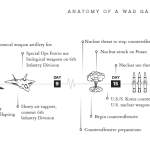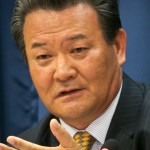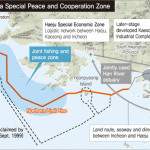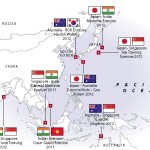- DETERRENCE: At war: notes from the front lines, globalization creates a new worry: enemy convergence
- DPRK: Situation on Korean Peninsula delicately balanced
- ENERGY SECURITY: Obama preparing big effort to curb climate change
- GOVERNANCE AND CIVIL SOCIETY: Summit transcript: Roh Moo-hyun’s idea was a peace zone, not abandonment
- CLIMATE CHANGE ADAPTATION: Least developed, most vulnerable: have climate finance promises been fulfilled for the LDCs?
- AUSTRAL PEACE AND SECURITY: The emerging Asia power web: the rise of bilateral intra-Asian security ties
 DETERRENCE: At war: notes from the front lines, globalization creates a new worry: enemy convergence, Thom Shanker, New York Times (30 May 2013)
DETERRENCE: At war: notes from the front lines, globalization creates a new worry: enemy convergence, Thom Shanker, New York Times (30 May 2013)
Admiral Stavridis’ scenario has a North Korea-like country seeking to attack the US or its allies without using a missile, contracting with a smuggling ring to move a weapon into a major port somewhere in the world.
- Anatomy of a war game: training for nuclear war on the Korean Peninsula, B. Bennett, World Policy Journal, vol. 29 (2012)
- Korean arms control, political-military strategies, studies, and games, R. Darilek et al, RAND MR 489-A, 1994 [PDF, 12.2MB]
- U.S. army learns hard lessons in N. Korea-like war game, Paul McLeary, Defense News (26 March 2013)
 DPRK: Situation on Korean Peninsula delicately balanced, People’s Daily Online, (24 June 2013)
DPRK: Situation on Korean Peninsula delicately balanced, People’s Daily Online, (24 June 2013)
South Korea’s President Park offers China something North Korean delegations have lacked – unprecedentedly large business contingents. She is also being offered a rare opportunity to speak to a Chinese political audience. North Korea’s entreaties were likely answered by an authoritative Chinese op-ed likely timed to address visits by both North and South Korea as well as the anniversary of the Korean War. The Chinese message is “balanced”.
- “Biggest ever” economic delegation to visit China; unprecedented South Korean attention (to China), Western Route Military Site, (25 June 2013) [Chinese-language]
- N. Korea demands the dissolution of the UN command in S. Korea, The Associated Press, (Canada) CTV News (21 June 2013)
- Report of the Panel of Experts established pursuant to resolution 1874, United Nations Security Council, (11 June 2013) [PDF, 592KB]
 ENERGY SECURITY: Obama preparing big effort to curb climate change, John M. Broder, New York Times (19 June 2013)
ENERGY SECURITY: Obama preparing big effort to curb climate change, John M. Broder, New York Times (19 June 2013)
Happier days are coming again? After the G8 meeting that said nothing substantive about climate change, Obama’s Berlin speech was to please the foreign fans, soothe domestic ones enough to bolster the 2014 vote, and keep a smiling face for FCCC COPs. In India, Kerry pretended to channel Mother Earth, and made a show of lecturing India to cut GHG emissions for the same reason. There will be no curbing climate change, but who is watching? What matters is fooling enough people long enough, distributing lollipops for advocacy groups and pandering to the donors for charities and elections.
- Kerry prods India to cut greenhouse gas emissions, Michael R. Gordon and John M. Broder, New York Times (23 June 2013)
- As deadly floods hit India, Kerry calls on New Delhi to address climate change, Krista Mahr, Time (24 June 2013)
- G8 Lough Erne 2013 Leaders Communique (18 June 2013)
 GOVERNANCE AND CIVIL SOCIETY: Summit transcript: Roh Moo-hyun’s idea was a peace zone, not abandonment, Gil Yun-hyung, Hankyoreh (25 June 2013)
GOVERNANCE AND CIVIL SOCIETY: Summit transcript: Roh Moo-hyun’s idea was a peace zone, not abandonment, Gil Yun-hyung, Hankyoreh (25 June 2013)
A transcript released by the ROK’s National Intelligence Service sheds further light on NLL talks between former President Roh and DPRK leader Kim Jong-il. The two leaders discussed a joint commercial zone crossing the NLL, which has been interpreted as a move towards cooperation by some and potential treason by others in the ROK. Current ROK President Park will discuss inter-Korean issues with Chinese President Xi in bilateral talks this week.
- Summit transcripts throw new light on Roh’s view of NLL, Chosun Ilbo (25 June 2013)
- The fallout from the NIS’s abrupt inter-Korean summit transcript release, Park Byong-su, Hankyoreh (25 June 2013)
- North Korea will dominate China and South Korea summit agenda, AFP (25 June 2013)
 CLIMATE CHANGE ADAPTATION: Least developed, most vulnerable: have climate finance promises been fulfilled for the LDCs? David Ciplet, Timmons Roberts, Mizan Khan, Spencer Fields and Keith Madden, European Capacity Building Initiative-ECBI (2013) [PDF, 325 KB]
CLIMATE CHANGE ADAPTATION: Least developed, most vulnerable: have climate finance promises been fulfilled for the LDCs? David Ciplet, Timmons Roberts, Mizan Khan, Spencer Fields and Keith Madden, European Capacity Building Initiative-ECBI (2013) [PDF, 325 KB]
Wealthy countries have not provided US$ 12 billion annually to support mitigation and adaptation measures in developing countries. Although they have committed US$ 3 billion more than the pledged US$ 30 billion during the three-year fast start period, only a fraction of this climate finance is new and additional, rather than simply being diverted from other pressing development needs such as health and education.
- Fast start adaptation funding: keeping promises from Copenhagen, David Ciplet et al., IIED Briefing, IIED (2010)
- Financing climate change action, OECD (2013)
 AUSTRAL PEACE AND SECURITY: The emerging Asia power web: the rise of bilateral intra-Asian security ties, Patrick M. Cronin et al., Center for a New American Security (June 2013)
AUSTRAL PEACE AND SECURITY: The emerging Asia power web: the rise of bilateral intra-Asian security ties, Patrick M. Cronin et al., Center for a New American Security (June 2013)
As the United States rebalances to Asia, it will confront a rapidly evolving regional security environment that is no longer solely defined by the U.S. “hub-and-spoke” alliance system. Countries in Asia – including Australia, India, Japan, Singapore, South Korea and Vietnam – are developing bilateral security ties with one another, primarily to hedge against critical uncertainties associated with the rise of China and the future role of the U.S. in the region.
- Defense management: more reliable cost estimates and further planning needed to inform the Marine Corps realignment initiatives in the Pacific, Government Accounting Office, GAO-13-360 (11 June 2013) [PDF, 4.76MB]
- India to help Vietnam build submarine fleet, Ritu Sharma, New Indian Express (16 September 2011)
- The Southeast Asian emphasis in DWP2013, Rod Lyon, The Strategist (21 June 2013)
The Nautilus Peace and Security Weekly Report presents articles and full length reports each week in six categories: Austral security, nuclear deterrence, energy security, climate change and security, the DPRK, climate change adaptation and governance and civil society. Our team of contributors carefully select items that highlight the links between these themes and the three regions in which our offices are found—North America, Northeast Asia, and the Austral-Asia region.
Subscribe to NAPSNet to receive free weekly email reports
Editor
Contributors
- Deterrence: Peter Hayes
- Governance and Civil Society: Dyana Mardon
- Climate Change Adaptation: Saleem Janjua
- DPRK: Roger Cavazos
- Energy Security: Nikhil Desai
- Austral Peace and Security: Richard Tanter

